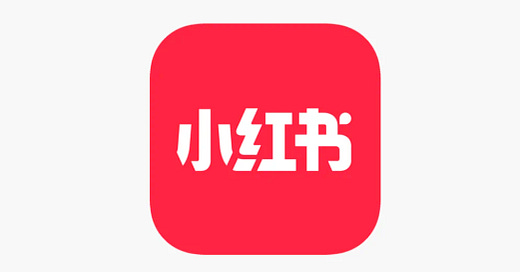What’s Next for American Users on China's RedNote? Four Scenarios
Shadows are already appearing over TikTok refugees’ honeymoon with a Chinese app
For my first post in 2025, I share four scenarios for how the influx of American TikTok users to the Chinese app Xiaohongshu (RedNote) could play out. Also in this issue, new data on the scale of asylum-seekers fleeing China under Xi Jinping, a book to recommend on PRC media influence in Latin America, and some rare good news for a family of Chinese human rights defenders.
Thank you for reading and if you find this information helpful, please subscribe and share with others.
As Tiktok Users Flock to RedNote, What Might Happen Next?
With a prospective ban on TikTok in the United States expected to occur on January 19, hundreds of thousands of U.S. internet users migrated this week to another China-based app, dubbing themselves “TikTok refugees.” That app is Xiaohongshu—literally, “Little Red Book,” a Maoist throwback, though U.S. users and media have been using the moniker RedNote to refer to the social media platform that includes features similar to Pinterest, Instagram, and yes, TikTok.
The phenomenon caught international attention when the app reached the top slot for downloads in the United States. Moreover, the sudden inflow of young Americans has spurred a rare moment of unfettered communication with their Chinese counterparts.
The lively, friendly, and humorous interactions between U.S. and Chinese users offer a glimpse into a parallel universe of open online conversations and cultural exchange in a world with a freer China.
Yet it’s worth remembering that it is the Chinese government’s own censorship apparatus—including blocks by the so-called Great Firewall and Chinese app store restrictions—which are the reason this experience of a shared platform is so unusual. Chinese users cannot join Facebook, Instagram, or X en masse without significant risks and technological work arounds. TikTok is itself the separate international spin-off of the Chinese short video app Douyin. Meanwhile, past spurts of open interactions—as occurred surrounding the 2021 launch of the Clubhouse app that allows for audio conversations—have been quickly shut down by Chinese regulators.
The difference now is that it is U.S. users being incentivized to cross over to a Chinese app rather than vice versa, leaving the Chinese government in a trickier predicament. The regime cannot just block the app without repercussions for its 300 million existing users, most of them within China.
Still, considering how the Chinese censorship apparatus works and other past examples, the current situation is certain not to last. The following are four possible scenarios for what might happen next, though the reality is likely to be some combination of these.
Scenario 1: The Chinese government gets spooked
Chinese party-state agencies—especially the Cybersecurity Administration of China and the Chinese Communist Party’s (CCP) propaganda department—are likely to put pressure on RedNote to tighten restrictions on U.S. users or to at least ensure they are able to enforce the kinds of limitations on political speech and information-sharing that are pervasive for Chinese citizens. That would mean U.S. users start to face deleted posts, shadow bans, hashtag manipulation, and shuttered accounts for repeat or severe violations.
According to several articles published today, this may have already begun. The app has started hiring more English-language content moderators, while rumors have circulated about plans to separate foreign and Chinese users based on their IP addresses. Meanwhile, according to TechCrunch several TikTokers have had accounts suspended for various reasons ranging from the app having trouble verifying their account with a foreign phone number to vague violations of the community guidelines (only available in Mandarin) to a mysterious case of an account frozen after posting an image of cinnamon rolls.
Setting aside technical difficulties and even if Americans tiptoe around well-known taboos in China, the real world is unpredictable. A breaking news story unrelated to China could prompt viral content from American users to agitate Chinese government censors and trigger a more sudden, large-scale crackdown. For example, people sharing photos and videos for attending a protest in the United States—perhaps surrounding President Trump’s upcoming inauguration or in response to an incident like George Floyd’s death.
That type of imagery and mobilization is among the most censored content on the Chinese web. Even information on natural disasters, the Chinese economy, or a U.S. celebrity who has criticized human rights in China have provoked censorship in the past. If tens of thousands of “TikTok refugees” start posting such content, RedNote is likely to face pressure to engage in a large-scale clean-up. Even within China’s tight political environment, we’ve seen such flare-ups at key moments, like when Xi Jinping extended his rule to a third term in 2018 or amidst the White Paper protests in 2022.
Scenario 2: RedNote withdraws
As RedNote and its executives come under greater pressure from Chinese regulators and face concerns of legal repercussions should they fail to rein in rebellious Americans, they may decide that the costs of welcoming so many U.S. users outweigh the benefits. In this scenario, the company may decide to withdraw the app of its own accord from U.S. app stores or perhaps follow TikTok’s model and create a global offshoot that operates separately from its China app.
Scenario 3: American users lose their appetite amid Beijing censorship
As American users start to run into the reality of not-so-free expression on a China-based app, experiencing the type of restrictions Chinese users face daily, how will they react? Will they be indignant at having their posts deleted or their hashtags arbitrarily suppressed? Most are not based in China and so one of the key drivers of self-censorship among Chinese users—the risk of arrest and even imprisonment—is largely irrelevant.
Some may self-censor, while others—the more politically minded—may vote with their feet, settling after all for Instagram or another international app. Others may split the difference—remaining active on RedNote for apolitical interactions with Chinese users, while relying on a U.S.-based platform for political speech or breaking news content.
From a commercial perspective, a larger obstacle for RedNote’s ability to retain Tiktok refugees long-term is the lack of options for monetization. Either way, it seems hard to imagine the current honeymoon period surviving for the long run.
Scenario 4: The U.S. government steps in
Assuming TikTok is banned in the United States and the law enabling that restriction is upheld by the Supreme Court, the relevant legislation was not limited only to apps by ByteDance, the company that owns TikTok. The bill includes a provision under which the U.S. could apply the same restrictions to other apps own by foreign adversaries, should the President determine that these “present a significant threat to the national security of the United States” and provide a report with justification to Congress.
Given that RedNote is fully China-based, it would arguably be an even higher national security risk than TikTok were its American userbase to reach a critical mass. Indeed, some experts have said the users are going “from the frying pan into the fire” in terms of data privacy and content manipulation concerns. Should incoming President Trump and his national security team agree, RedNote could find itself also facing TikTok’s fate.
Closing thoughts
What happens to TikTok in the United States remains to be seen as the deadline looms. The app’s potential risk to U.S. national security is real, as is the loss felt by its over 170 million users. Nonetheless, the events of the past week and the lively, friendly, and humorous interactions over RedNote between American and Chinese youth offer a glimpse into a parallel universe of open online conversations and cultural exchange in a world with a freer China.
But on the flip side, they also offer a hint of what the CCP—with its imposition of the Great Firewall—has stolen not only from Chinese people but also from the wider world.
What I’m reading: Chinese asylum-seekers, public diplomacy report, Latin America book
Safeguard Defenders’ data on Chinese asylum seekers: On January 6, the Spanish-based rights group Safeguard Defenders (SD) published a short report with a staggering finding: over one million Chinese have sought asylum abroad since Xi Jinping took over leadership of the CCP in 2012. This represents a significant uptick compared to the Hu Jintao era. The figure is based on data collected by the UN High Commissioner for Refugees (UNHCR), which SD forecasts will surpass 176,000 (compared to 12,362 in 2012). These increases have emerged amid tightening repression in China and the launch of dramatic crackdowns against Uyghurs and Hong Kongers, prompting many from those communities to flee the PRC. The report says that the United States remains the most popular destination.
2024 Report of the Advisory Commission on Public Diplomacy (ACPD): Yesterday, I was honored to speak on a panel about China’s public diplomacy and foreign media influence efforts that the ACPD organized. Beyond the fascinating discussion with co-panelists Samantha Custer and Igor Patrick, the event prompted me to become more familiar with the council and its work. In December, the ACPD published an eye-opening annual report that consolidates data, budget information, and U.S. public diplomacy activities. It also includes thoughtful and well-informed recommendations to different parts of the U.S. government, from the White House to the State Department, to Congress. For those interested in how the U.S. government has been and should be investing resources to address adversaries’ foreign-facing propaganda and information manipulation, it’s a great resource. The event video and transcript should be published here in the coming week.
Book on Chinese state media influence in Latin America: In March 2024, the Wilson Center published a book by Brazilian journalist Igor Patrick, titled Hearts & Minds, Votes & Contracts: China’s State Media in Latin America. The carefully researched publication brings together concrete examples of Chinese state-backed content appearing in the region’s media outlets, rich data, findings from academic studies, and first-hand accounts and anecdotes from interviewees and Igor’s own observations. I had read parts in advance of a book launch hosted by the Wilson Center, but hearing Igor speak again about his on-the-ground findings and real-world examples from across Latin America during the above ACPD panel has impelled me to take another close look. The full PDF version is available for free download from the Wilson Center’s website.
Prisoner to remember: Beijing activist Xu Yan released even as husband still jailed
On January 13, Weiquanwang, a website that relays updates on Chinese human rights defenders’ cases from a network of grassroots contacts in China, announced that activist Xu Yan has been released from custody after serving a 1 year and 9 month prison sentence. Xu had been detained alongside her husband human rights lawyer Yu Wensheng in April 2023 when en route to a meeting with European diplomats. The couple was put on trial in August 2024 and found guilty of “inciting subversion” for their rights activism in a trial that per usual lacked real due process. Yu Wensheng’s appeal was rejected on January 6 and he has over a year left to his three-year sentence.
It's heartening to hear that Xu has been released and can be reunited with the couple’s college-age son. Let’s hope that the Beijing police leave her in peace so she can recover (she reportedly lost a significant amount of weight in detention) and her husband is able to join them sooner than expected.






This is a really post. Really informative.
Is the new administration going to locate and investigate the thousands of Chinese illegal migrants of military age who arrived under Biden?